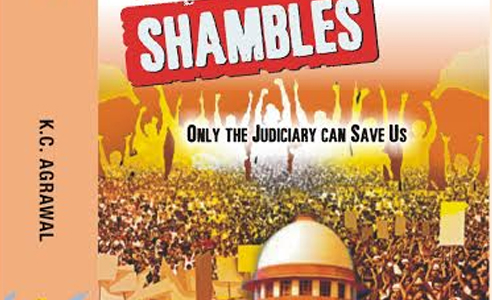M.N. VENKATACHALIAH

Justice M.N. Venkatachaliah
Former Chief Justice of India
Chairperson of National Commission to
Review the Working of the Constitution
Foreword
"India in Shambles" is the impassioned out-pouring of an anguished heart of a true patriot, sensitive to the present dismal conditions of Governance. Everyone, of course, agrees that the politics and the administration could have, over the years been mismanaged better. But, then, how does the exhortation of hopelessness help? Is, as the author says, the intervention of the judiciary the only hope? The answers are difficult.
Mr. Agrawal expresses his frustration in these words:
The regressive and continually deteriorating plight of our large populace is no secret. About 110 crore of India's population exists under highly impoverished and wretched conditions. Forty percent of our country is infected with Maoism, Naxalism, terrorism and seditious activism. People from all walks of lives are disgruntled and frustrated. Protests and movements are now a regular feature in our country. Consistent failures of our Legislature and Executive are no longer acceptable.
The present book is an attempt to accomplish the same through responsible and accountable system of governance at the Union and the States to be established with the help of the learned Judiciary.
Both the problem and the suggested judicial paternalism as a solution need to be put in perspective. The choice of the Republican form of Government at the advent of India's freedom drew derisive and cynical remarks from the Western Press. How can 330 million ignorant people, they asked manage a sophisticated system of parliamentary democracy of the West minster model? But then the same press, later at the 60th anniversary of India's independence described Indian democracy as 'robust but chaotic'. It was also characterized as the 'Rowdiest'. But, it is Democracy nevertheless. Consider the achievements in the electoral front: 820 Million Voters, a million polling booths and polling team having had to cross a mountain on an elephant-back to operate a polling booth for the sake of just two voters!
Critics of political developments in India should not put out of consideration the inherited historical problems. The present seemingly chaotic conditions are the products of some irreversible movements of history. A feudal social order is grimly struggling to be reborn as a modern, egalitarian, industrial society. Such transformations are always painful; quite often violent. We are going through one such phase. India, it is said, lives concurrently in several centuries. It is even characterized as a great civilization in an advanced stage of decay. India's constitution making was itself a great and noble effort at consensus building and compromises. One important factor has been the demographic explosion; the sheer staggering size of population growth that we have witnessed since independence.
Then too, the world as one scientist said is no longer divided by ideology; but divided by technology'. The rapid advances of science will make the 21st Century the most stunning century in history. While the 20th Century was a hundred years of science the 21st will be 20,000 years of science. The expected economic and industrial turbulence will make the management of the forces of change most difficult posing great challenges. At such critical times as these people tend to become cynical and too sharp for loyalties. It needs great and sagacious leadership.
Can judiciary alone be trusted to provide that political and economic leadership? Has the judiciary the stock of social and economic wisdom to provide solutions to all of society's problems? I think that it is only a weak society that looks-up to the judiciary as the sole provider of stability and prosperity and resolution of all its problems. That apart, such over-dependence on the judicial resources might even rob the people of the excitement of democracy to fight issues-out in an open democratic way. Democracy is not the best form of Government. Its merit is that it is the least hostile amongst all other systems tried so for. Democracy assures that people get no better government than they deserve. Solutions to the problems of democracy are more democracy. If the spirit of liberty lives in the hearts of the people no one needs to supply it. But if it is not in their hearts on one can supply it.
While I understand the anguish of a sensitive soul like Sri. Agrawal, I request him to ponder over the correct democratic solutions to the issues he has so rightly raised. But his book as a presentation of the present predicament of the country deserves to be read by all.
November 8, 2016
Bangalore M.N. Venkatachaliah









